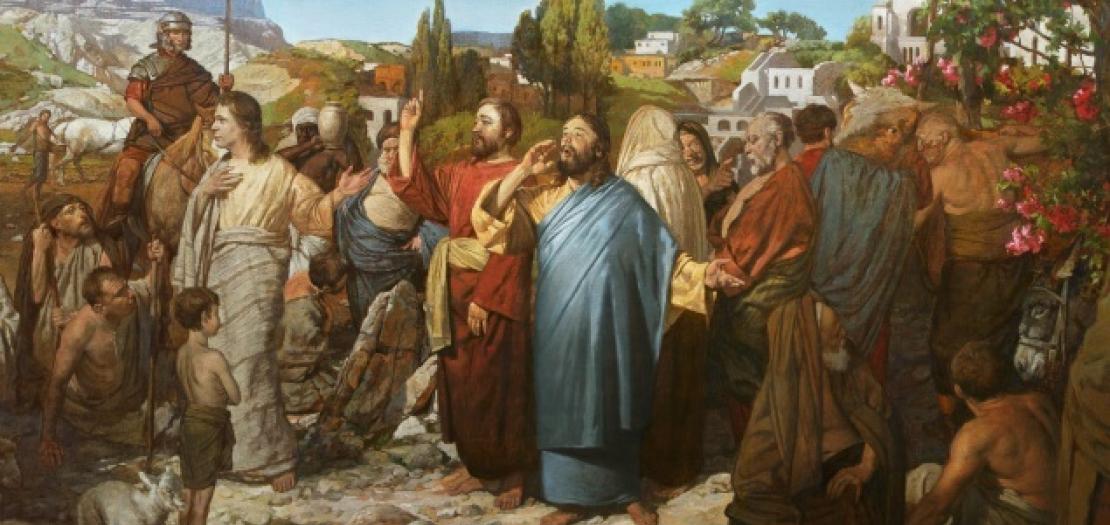Issued by the Catholic Center for Studies and Media - Jordan. Editor-in-chief Fr. Rif'at Bader - موقع أبونا abouna.org

Following is the meditation of Most Rev. Archbishop Pierbattista Pizzaballa, Apostolic Administrator of the Latin Patriarchate of Jerusalem, for the 28th Sunday in Ordinary Time, Year A, October 11, 2020:
The first element that seems important to highlight in the parable recounted in the passage of today’s Gospel (Mt 22:1-14) is that which speaks of a wedding banquet, but the protagonists are not so much the spouses as the guests. The entire parable speaks of them, the solicitude of which they are the object, their behavior, their refusal, or their acceptance of the invitation.
Besides the guests, there is the father of the groom, the king, who has this great concern in his heart, the desire that the wedding banquet prepared for his son can cheer up as many people as possible, that his home is open and becomes a home for others.
He organizes the feast; he makes the invitations; sends for the guests; changes plans; makes sure that the room is full; he enters the place to see the diners.
There is no mention of the bride and groom, and the protagonists of the wedding are the guests. The wedding seems to be celebrated for them.
The guests belong to two groups – the first group, smaller, made up of known persons and friends. And there is another group, more extensive, to which all the others belong.
The first group, already invited to the wedding for some time, unanimously refuses to go. They exclude themselves from the feast.
None of them goes out of their little world, and everyone makes different kinds of excuses. And added to this, they do not want to give up anything of their plans, their habits. They do not want to open up to a feast, to great joy.
They refuse the wedding invitation to go to work, to stay in their own things as if they were the most important in their life.
They do not do anything evil; it is just that they continue to do what they are doing without understanding that the wedding time has come, without recognizing the generous gift, the great dignity of being invited.
And when the king insists, they are annoyed by his concern to the point of eliminating whoever oversees bringing them the invitation. They do not want to have anything to do with this king, with this event. Being able to continue to do what they have always done, without opening to the fulfillment of the gift becomes a priority so absolute that they must eliminate everyone that tries to propose another.
The guests are invited to life, but they never enter the wedding.
For this reason, the recipients of the invitation change. The king does not give up. He cannot accept that everything he has prepared is lost and enlarges the list of guests. And so, it happens that all others suddenly find themselves invited to the wedding.
The text twice highlights this term: everyone (Mt 22:9,10).
If before the guests were just a few, now they are everyone, all those in the street. If the guests change, so does the face of the wedding. It is reserved no more to the lucky few, but it is for everyone.
This feast changes its face and becomes accessible not only to someone but to everyone.
The text is keen to specify who everyone is when the king sends his servants to invite anyone they will meet on the street, the good and the bad (Mt 22:10).
Regardless of their moral life, regardless of their faith, they become worthy to participate in the wedding, unlike the former, who were unworthy (“The wedding feast is ready but the invited were not worthy” – Mt 22:8).
Therefore, those who accept the invitation are worthy and are those who prefer not to follow personal objectives. Instead, they open themselves to the newness of the Kingdom that breaks through.
But even for those, there is a risk. As the first group remained outside the feast, so also it can happen to the second.
Indeed, whoever enters the wedding but does not adapt to the gift received – those who do not allow themselves to be clothed and transformed by the beauty that is given to them, who do not make this celebration their life – in reality, it is as if they stayed outside. And they are destined to return there.
God does not call us because we are good, but by calling us, He wants to make us good.
The refusal to participate in the wedding, therefore, can take different forms: the most obvious one, that of the first guests, or the more subtle one of those who entered without suitable attire. For both, it is not without consequences: the former group is killed, and their cities are destroyed (Mt 22:7); the second cast out into the darkness (Mt 22:13).
It is not just a question of attending a feast; it is a question of accessing real life.
+Pierbattista







